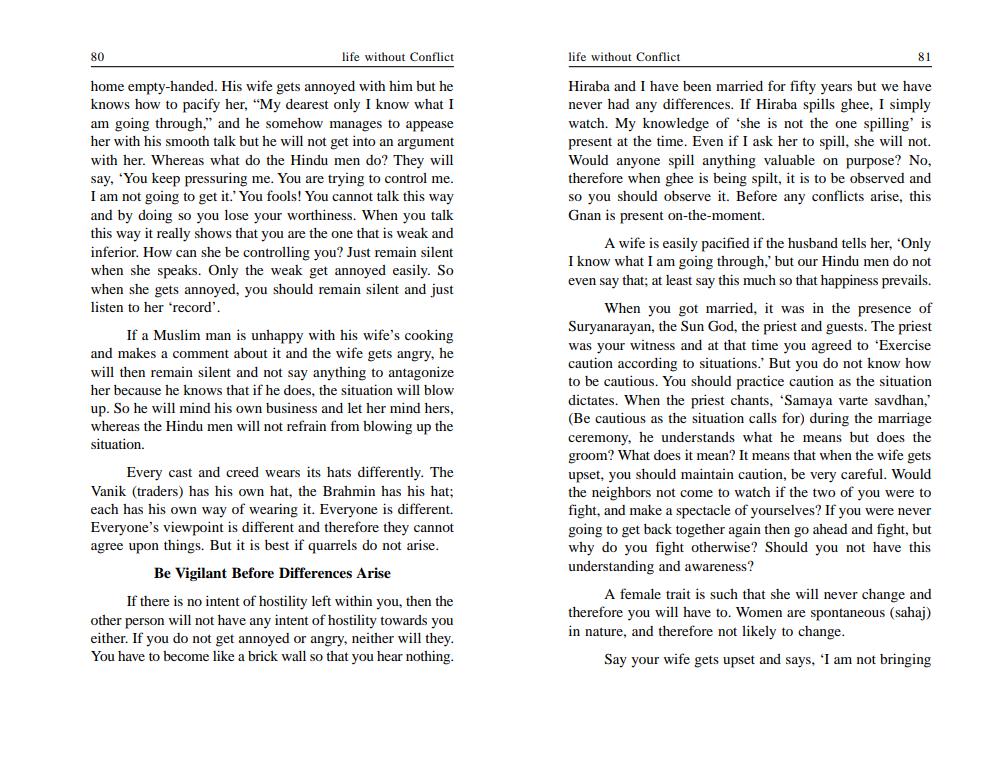________________
80
life without Conflict
life without Conflict
81
home empty-handed. His wife gets annoyed with him but he knows how to pacify her, "My dearest only I know what I am going through," and he somehow manages to appease her with his smooth talk but he will not get into an argument with her. Whereas what do the Hindu men do? They will say, 'You keep pressuring me. You are trying to control me. I am not going to get it.' You fools! You cannot talk this way and by doing so you lose your worthiness. When you talk this way it really shows that you are the one that is weak and inferior. How can she be controlling you? Just remain silent when she speaks. Only the weak get annoyed easily. So when she gets annoyed, you should remain silent and just listen to her 'record'.
If a Muslim man is unhappy with his wife's cooking and makes a comment about it and the wife gets angry, he will then remain silent and not say anything to antagonize her because he knows that if he does, the situation will blow up. So he will mind his own business and let her mind hers, whereas the Hindu men will not refrain from blowing up the situation.
Every cast and creed wears its hats differently. The Vanik (traders) has his own hat, the Brahmin has his hat; each has his own way of wearing it. Everyone is different Everyone's viewpoint is different and therefore they cannot agree upon things. But it is best if quarrels do not arise.
Be Vigilant Before Differences Arise If there is no intent of hostility left within you, then the other person will not have any intent of hostility towards you either. If you do not get annoyed or angry, neither will they. You have to become like a brick wall so that you hear nothing.
Hiraba and I have been married for fifty years but we have never had any differences. If Hiraba spills ghee, I simply watch. My knowledge of 'she is not the one spilling' is present at the time. Even if I ask her to spill, she will not. Would anyone spill anything valuable on purpose? No, therefore when ghee is being spilt, it is to be observed and so you should observe it. Before any conflicts arise, this Gnan is present on-the-moment.
A wife is easily pacified if the husband tells her, 'Only I know what I am going through, but our Hindu men do not even say that at least say this much so that happiness prevails.
When you got married, it was in the presence of Suryanarayan, the Sun God, the priest and guests. The priest was your witness and at that time you agreed to 'Exercise caution according to situations. But you do not know how to be cautious. You should practice caution as the situation dictates. When the priest chants, 'Samaya varte savdhan, (Be cautious as the situation calls for) during the marriage ceremony, he understands what he means but does the groom? What does it mean? It means that when the wife gets upset, you should maintain caution, be very careful. Would the neighbors not come to watch if the two of you were to fight, and make a spectacle of yourselves? If you were never going to get back together again then go ahead and fight, but why do you fight otherwise? Should you not have this understanding and awareness?
A female trait is such that she will never change and therefore you will have to. Women are spontaneous (sahaj) in nature, and therefore not likely to change.
Say your wife gets upset and says, 'I am not bringing




